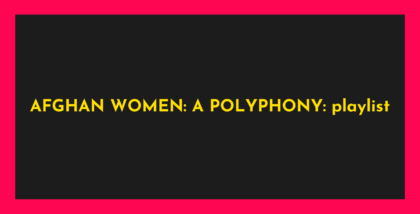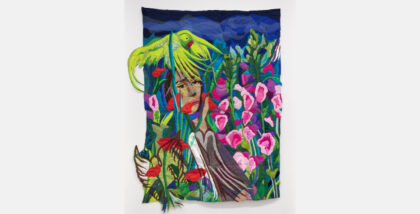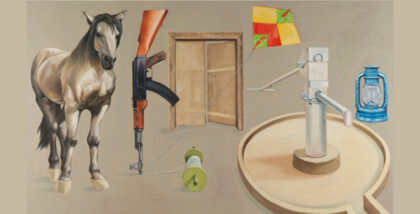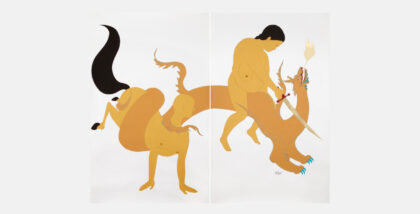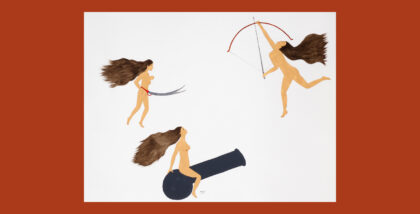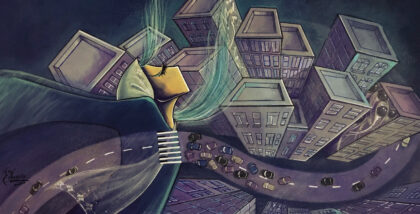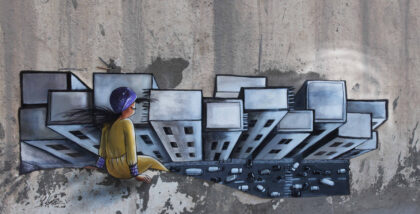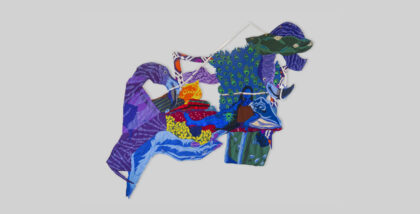 Self-portrait with Tooti Parrot, Hangama Amiri. Courtesy of the artist.
Self-portrait with Tooti Parrot, Hangama Amiri. Courtesy of the artist.
I walk behind Khorshed* while the others trail us. Down the gravel path to reach the paved road. Towards an open field where the Panjshir river flows under the majestic Hindu Kush mountains.
We had just had our breakfast following the morning call to prayer. Kaymak—clotted cream—with fresh bread from the bakery and honey brought over by Pari, who harvested it in her yard to sell in the local bazaar.
I call her khala Khorshed, aunt Khorshed, because although she is my first cousin, I am in my mid-20s, and she is in her late 40s. She becomes khala because of my respect for her.
I had recently arrived in Afghanistan from Oxford to conduct doctoral fieldwork. It was spring 2019, and Kabul was riddled with violence. The Taliban had started their annual “spring offensive” against the US occupying forces and the American-backed government, which meant that all civilian lives were fair game.
Panjshir was a secure province at that time. It is where my grandfather has a small plot of land stretching up the mountain in our village. His garden has many black and white mulberry trees, as well as apple, peach, and cherry. Through the decades of war, these trees defied the brunt of destruction and grew fruit. And a spring from somewhere at the top of the mountains made small waterfalls next to these trees. A respite from Kabul’s unbearable pollution and unending bloodshed.
Khorshed is tall and glides over the gravel as we descend from the mountain where her mother lives. I try to keep up, stepping strategically over the rocks and thorn bushes. I knew that bringing my worn out Nike tennis shoes was a bad idea. I keep my eyes on the ground, following Khorshed’s bright pink kitchen sandals.
As we reach the paved road, I glance up and look at the open field in front of us. A few days ago, I watched a Buzkashi tournament here, with men on horseback competing to pull a goat carcass into a goal. I remember peeking through my cousins’ broad shoulders during the tournament. The Buzkashi riders looked like warriors from the Shahnamah, the Persian epic book of kings which my elder uncle used to read to us in his rumbling voice under the starry nights after the Taliban had destroyed the electricity poles. The earth shook as the horses galloped against the backdrop of the mountains. It was breathtaking.
Khorshed stops in the middle of the road. I pause behind her, and watch her look around, the red of her hair shimmering in the sun under her long chadar. A large poster of Ahmad Shah Massoud, the resistance commander who fought against the Soviet occupation in the 80s, and against other political factions and the Taliban in the 90s, looms over her. His origins are in this province. I try to make out the Persian words in the poster, but it is too far.
Khorshed points to the field, where a rusty swing moves gently in the breeze. There are a few pieces of old playground equipment, mud bricks, and some weeds. She starts to speak.
“Bahar and Yasameen were playing there,” she says, referring to her two younger twin sisters. “I was in the house. We were all in the house. Then Bobo [Khorshed’s mother] was injured. Father was martyred. Fatima was injured. Ismael was injured. Yousuf was young. Then they took all of them and I was left in the house.”
It is so abrupt, the way she recounts this violence. I had heard this story growing up, but just in fragments. No one asks the details of someone’s martyrdom. You say, ‘may God forgive them’ and change the subject.
Unless, as in this instance, it is invoked. When the landscape is charged with memory and the history of a painful past is your present.
I stand still, hold my breath, and keep my gaze steady with hers. I wait for her to continue. Out of respect.
“Little Mahtab was in the gahwara [cradle],” she says.
Khorshed motions to keep going. We walk slowly. I see unkempt gravesites covered with weeds and thorn bushes alongside the road. Tattered green flags on the graves wave in the wind.
“I think I was around nine or ten years old.”
This was the 1980s, during a time of indiscriminate aerial bombardments by the Soviet occupiers. Because Ahmad Shah Massoud had his main stronghold in Panjshir, the province took the brunt of destruction by the Soviets and their client state.
“When we first came here, there was no home. My father made the windows. There was no glass, so he taped plastic instead. We had just come to this place, and you know that bridge there—” Khorshed angles her head, referring to pul-e Bazarak, the bridge in the provincial capital of Panjshir. “My uncle was martyred there. He was 19 years old. A rocket hit his head and his head went missing. We had his fatiha-gere [funeral] here. Twenty days after he became shaheed [martyred], my father became shaheed.”
Khorshed goes on: “It was winter. I remember it very well. I had been helping my father put plastic on the windows. Each time we put new plastic, there would be a bombing, and the plastic would tear.
That day, Bahar and Yasameen were playing. We heard planes. I was so scared of planes. We ran and went under the house where we kept the cows. Bahar and Yasameen were still in the field.
But my father, no matter how much we tried to keep him inside, he wouldn’t stay. My father was a pilot. He said that he wanted to see where the plane would hit.
We saw it hit this field.
Bahar and Yasameen were under the rubble.”
Khorshed takes a breath and shield her eyes from the sun with her hand as she looks around.
“No matter how many times Bobo said do not go, my father didn’t listen. He opened the door, went outside, and closed the door behind him on us.
We heard a loud sound and saw fire hit our door. We were sitting and had placed the gahwara on the hay. Dirt, dust, and rocks hit all of us. Bobo screamed. All I saw was fire coming towards us.
I remember there was blood somewhere. Ismael’s leg was broken. Bobo had blood here—” she points to her eyes.
“I kept saying, ‘where is my Agha, where is my father, what had happened to him, what happened to him.’ Fatima and I ran outside. Agha was lying down. He kept repeating ‘pick me up, pick me up.’
He said this only until the plane circled back and bombarded us again.
Fatima and I ran back inside. When we came back outside, my father was lying down horizontally, and his stomach was torn open. His insides had come out.”
Khorshed lowers her voice to a whisper.
“I knew then, even though I was very young, that he was gone, Munazza.
All of this took place in just ten minutes. Soon everyone in the region came to us. Whenever a plane bombarded an area, people would run to gather the martyrs.
Our neighbors arrived. Sultan, may God forgive her, Musa’s mother. She had come just five minutes before the bombardment and asked us for a teacup. She had guests over to her house that day. She came running towards us, screaming.
Zia came from somewhere and took my mother on his back. She had blood from here and here.” She points to her face again as she lowers her voice.
“They took everyone. I remember my uncle Wakeel, may God forgive him, he had a bicycle. He picked up Bahar and Yasameen. They were not injured. And he took the other younger ones. I was left alone in the house by myself.
I was the only one not injured in the family.
God’s honest truth I was not scared.
Then Amir Sahib [commander Ahmad Shah Massoud] came. The mujahideen were around. They would come quickly after bombardments to tend to the injured and bury the martyrs. I don’t remember who picked up my father and took him.
My father was a pilot. He had a pilot book where he logged the number of hours he had flown. At that age, I thought that this was the greatest book to have existed,” Khorshed says, laughing and looking away.
“I waited by myself until it was dark. I took the book under my arm and went walking to Qalah-e Bala, up there.” She points towards the mountains from where we had just descended.
“As I started to make my way to Qalah-e Bala, there was a woman, Mariam. She asked me where I was going. I said I was going to go see my injured mother.
As I said this, I turned to the side, and I saw a chahar paye, a wooden bed held together by ropes, coming my way.
I saw that Amir Sahib, may God have mercy on his soul, was in the front, and the mujahideen were around him carrying it. I knew instantly that my father was on that bed. He was coming directly towards me.
His feet were bare. He did not have shoes. I saw his bare feet when they were carrying the chahar paye. And I said my god, that is my dear Agha. Those were his feet.
I screamed. Mariam held me in her arms and said nothing has happened. I said no, I saw him. Those are his feet. I cried. And Mariam took me to Bobo and the family.
When I got there, none of them knew. Only I knew that my father was martyred. Others were injured.
One or two days passed. I told your mother who was 19 then, ‘I know something that no one else knows.’ She asked what it was. I said that my father has been martyred. She said, ‘don’t dare say this to your Bobo, she does not know, and she should not know in her condition.’
We did not tell her for months. She learned of her husband’s martyrdom in a hospital when she went to visit Ismael. She had lost sight in one eye from the bombardment.”
*
I follow Khorshed’s story in silence. What is there to say? Here, every conversation is tinged with sorrow, every landscape is charged with atrocity. There isn’t just one aggressor, but layers of occupation, war, and painful memories, which surface all the time, and press upon the recesses of our lives.
Ava, Khorshed’s 9-year-old daughter, who has been walking behind us, asks, “Mother, is this from that time?” pointing to one of the graves along the road. Khorshed looks and her face lights up.
“Look at this grave, Munazza, this is of our great-grandfather. They finally made the tombstone.”
More martyrs are always anticipated as wars and occupations continue. Panjshir, Khorshed’s mother’s house, and my grandfather’s stretch of land, with its fruit trees and waterfalls, are currently under Taliban occupation.
Violence is ongoing for us, generational; it is our past, our present, our anticipated future.
*Names have been anonymized for the safety of interlocutors.
